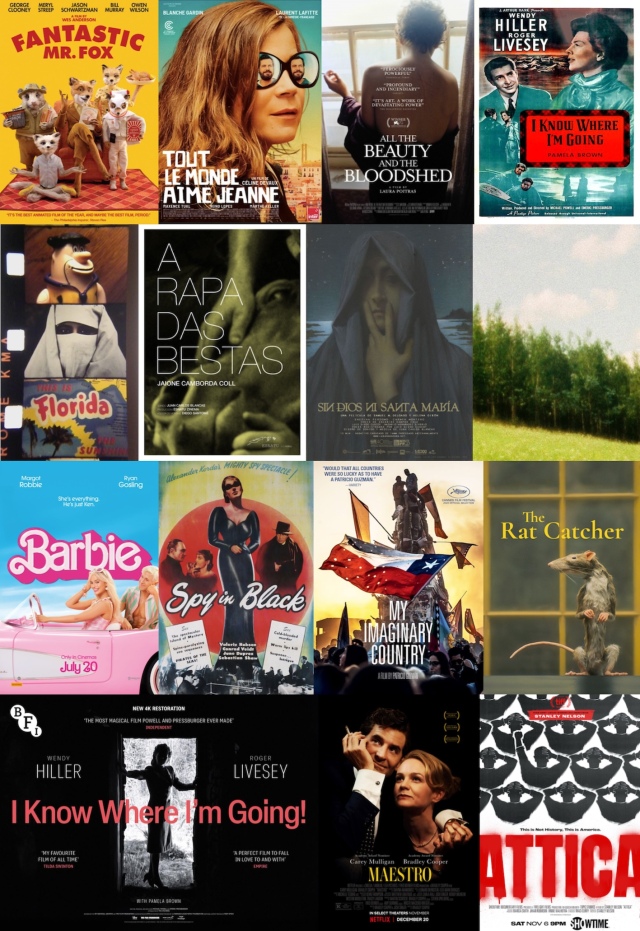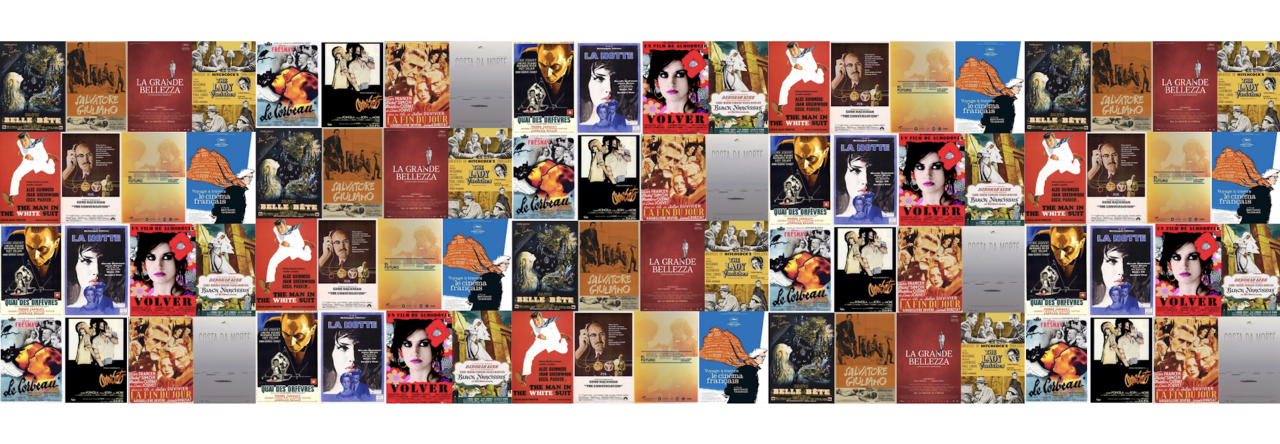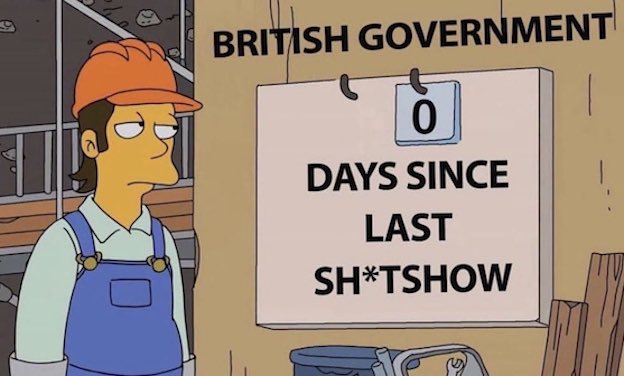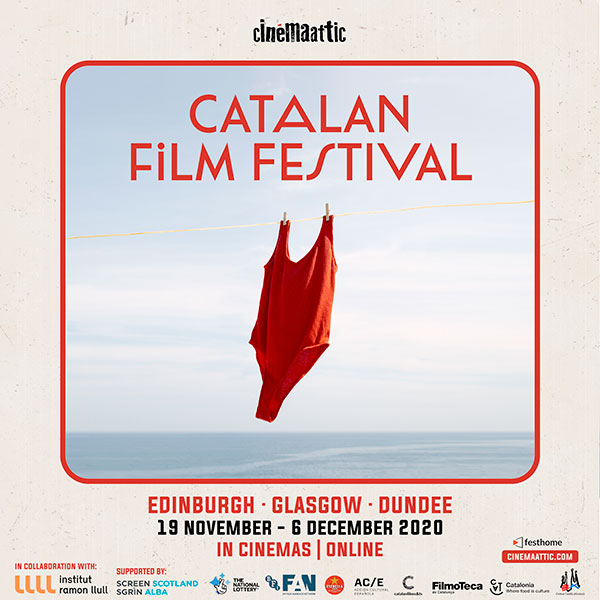
My last viewing update was towards the end of July, so I thought I’d better get on with posting this one before the year ends.

At the moment – alongside Spanish cinema – my main cinematic field of interest involves documentaries and variations of non-fiction filmmaking.

My last viewing update was towards the end of July, so I thought I’d better get on with posting this one before the year ends.
IberoDocs’ 9th edition will take place 6th-10th April for in-person events (in Edinburgh and Glasgow) and 11th-17th online, with seven feature documentaries and a shorts programme. Their opening film will be Neus Ballús’s Sis dies corrents / The Odd Job Men – which is on my want-to-see list, although I’ll have to wait as it’s one of two films that aren’t included in the online programme.
The theme connecting the chosen Spanish, Portuguese, and Latin American films is ‘territory, belonging, and migration’. You can find further details of the films in the programme/schedule, which can be downloaded here. The prices for the online presentation are either £10 for a single film, or £20 for a full pass.

Iberodocs returns in an online format for its 8th edition, 19th April – 2nd May. Accessible to viewers in the UK and Ireland, the 21 participating documentaries (features and shorts) can be viewed with a festival pass costing £15, or individually for £5. Full details are available on the festival’s website.
I have written about some of the films shown in previous editions in the past (as far back as the 2nd edition on the old blog!), and always found the programme to be a thought-provoking exploration of current documentary practice by Spanish, Portuguese, and Latin American filmmakers.

Where to begin? It feels inappropriate to summarise 2020 solely with a list of what I’ve read and watched. Bigger things were afoot. Although there are some global commonalities to this year, I’m sure that we have all experienced them differently at an individual level.

Well, this is something nice in 2020! Cinemaattic are simultaneously holding their Catalan Film Festival at various locations in Scotland and online between 19th November and 6th December.
The programme offers a range of new and classic features, four programmes of shorts, and a series of talks/Q&As – all of which will be available online. You can buy tickets for strands of films (the links are within the programme page), or a festival pass that covers everything will only set you back £10/11€. I have bought one of those – for more than two weeks of access, and the sheer number of films, that’s really good value.
It looks like an admirably diverse set of titles. I’m hoping that I will manage to catch Luis López Carrasco’s El año de descubrimiento (which I mentioned way back last year, and have already missed at least one chance of watching – I will confess that my patience with very long films is somewhat diminished of late but I’ll try not to let that put me off), and I’ve also heard good things about My Mexican Bretzel (dir. Nuria Giménez Lorang), and Las niñas (dir. Pilar Palomero – who also has a retrospective of her shorts). I will watch as many of the shorts as I can because they are something that I’ve missed since I stopped attending film festivals.

My Twitter bio used to say ‘Lives vicariously through books and films’, and I think that I have pursued escapism through books this year (films, not so much). I finally hit my ’52 books in a year’ target! I am currently reading book no.59, but I’m unlikely to finish it before the year is over. I started a new job back in May, and was doing a fair amount of background reading in the first half of the year (I applied in January and was interviewed in March, so the application process was quite elongated) – I usually only include books read ‘for fun’ or my own curiosity, but there is work-related reading in my tally this year (nothing ‘how to…’ but more thematic or topically relevant non-fiction), mainly because it was done in my own time and to answer my own questions, so it ‘counts’.
New job aside, 2019 can be characterised as ‘ugh’. We’re ending on a low. I wasn’t as shocked by the election result as I was in 2015, but I was still surprised and dismayed by the scale of the defeat. The Windrush scandal alone should have seen them turfed out on their arses…and that is the tip of the iceberg of what they have done in the last nine years. Now with a sizeable majority, they have a free rein. I don’t remember exactly what was going on at the time, but my reading a combination of ten John Sandford and Robert Crais books back-to-back over the course of two weeks or so in August is illustrative of a desire to block out the news (my literary crime sprees occur when I’m low or need distraction).
I usually list my standouts for the year in alphabetical order, but this year my favourite was far out ahead of everything else, so I’m going to list them in order of preference. My overall top 5 were:
Honourable mentions: An Honourable Man – Paul Vidich, Four Words for Friend – Marek Kohn, and The Equestrienne – Uršula Kovalyk. I’m aware that these selections are weighted towards the second half of the year, but I believe that has more to do with the first half of the year’s reading including the aforementioned background reading (and a focus on work), rather than them simply being fresher in my mind. My crime spree hit a reset button and I got on to a good run of fiction in the last few months of the year. I wouldn’t ordinarily read so many books by the same authors in one year, never mind back-to-back (even the best writers get a bit same-y or the stories run into each other, especially with recurring characters), but I was attempting to catch up on certain long running series by Sandford and Crais.
2020: I still have another series of Sandford’s to catch up with, and also Philip Kerr’s Bernie Gunther books, of which I’ve got at least four to read. I’ll keep on with the short stories and novellas – and I didn’t read as much in translation this year, so I’ll put more effort into that again. In the first half of the year I managed to read non-fiction during my morning commute and I want to re-start that (it tailed off after the summer and I either got sucked into reading the news or stared out the window instead). I still haven’t got back into longer books (I’m talking 400+ pages), but maybe this will be the year when I finally read John le Carré’s The Honourable Schoolboy.
Online articles that I’ve found interesting or thought provoking in one way or another (usual disclaimer: I don’t necessarily agree with them, but think that they are worth reading). I’m going to list them in chronological order because a number of them relate to situations that developed over the course of the year (UK politics/social issues, mainly). Where I don’t know the date, I’ve positioned them where they occur in my bookmarks (on the basis that I must have read them at that point in time). You will also notice that they are not evenly distributed throughout the year – the large gaps are where I was deliberately spending less time online, and the clusters in certain months are where I felt the need to pay attention (noticeably in relation to the General Election). There’s not much film writing included, which is indicative of my general levels of interest but also I’ve found that without Twitter I encounter less of that subject matter. Articles from The Guardian are mainly from their Long Reads series – I subscribe to the RSS feed of certain sections of the paper and those of specific journalists (part of a strategy to avoid the clickbaity provocations of the main page). The London Review of Books (LRB) has a new website and has removed the paywall until mid-January, so I’d advise you to fill your boots over there.

I was in half a mind to just have an image from the film(s) I want to talk about, but having displayed everything that I’ve read, I thought that I may as well display the entirety of what I’ve watched as well. It’s an odd assortment. Four more titles than last year but still very few in terms of my older habits. All but two of them are documentaries or documentary series – I have had zero interest in watching fiction recently.
My favourite thing that I’ve watched this year is the combination of Bertrand Tavernier’s 3 hour documentary on French cinema and his subsequent 6 part TV series that continued on the same subject (if you look closer, you’ll see that the second poster puts the title into the plural). The TV series (the French DVD set has optional English subtitles) covers the same time frame (he again stops at the point when he began making films himself) but different films and filmmakers to the documentary film – even with what must be more than 8 hours, it feels like he barely scratches the surface of his enthusiasms. As with Scorsese’s documentaries on Italian and American cinemas, you’re getting a personal view of the films rather than a straightforward history, but that’s what I find so engaging – not just that you’re getting a knowledgeable person’s recommendations, but that you’re getting introductions to titles that don’t necessarily feature in the sanctified canon. [If someone could make an equivalent for Spanish cinema, that’d be grand].
My knowledge of French cinema is fairly basic (certainly in comparison to Spanish cinema) or feels un-informed, essentially confined to what was covered in either an Introduction to Film Studies module, or a semester-long undergraduate module which concentrated on the 1980s (Besson, Beineix, Carax – and the cinéma du look) onwards. That said, French films had decent distribution during my teenage years and into my twenties, so I did watch a lot of French films – and developed a love of Claude Chabrol and Lino Ventura – both at the cinema and via Lovefilm, and initially my PhD was going to include French cinema, so I had subscriptions to French film magazines and was paying attention to what was being made at that point. But in terms of what French cinema means to French people, my understanding was limited (although the film magazines were interesting in that regard in terms of what was popular and who got coverage – that’s why I still have subscriptions to Spanish film mags; if I had to rely on information filtering through to UK/US publications, I wouldn’t know anything or anyone).
After watching Tavernier’s films, I have discovered that where Pathé and Gaumont have in recent years restored older films for French home viewing, a fair few have optional English subtitles – I now have a small pile of imported films by Duvivier, Clouzot, Lautner, Grangier, Grémillon, Becker, and others. In 2020 I’ll be looking to rekindle my interest in cinema via these treasures. I have given up on contemporary cinema at the moment – at least in terms of going to the cinema – but alongside the French imports (of old films) I am hoping to start watching some of the (recent) Spanish films that I’ve imported in the last couple of years (although I think I’ve said that in each of the equivalent posts in the last two years). So 2020 may be a year of French and Spanish cinema for me…and more documentaries, no doubt. Hasta pronto.

I completely missed Festival Márgenes last year. I don’t remember exactly how that happened – it either took place earlier than previous years (I have a vague recollection of finding out after it was over), or it coincided with me having norovirus (which I have pretty successfully blocked from my memory, but it occurred at the same time of the year). Either way, I missed something that has been an annual event on the blog since 2014 – and I have always previously found something to spark my interest, that I might not have otherwise encountered.
The festival focuses on films without theatrical distribution (a lot of the films are documentaries and there are usually quite a few medium-length films included), made on the margins (or outside) of existing film industries in the Iberian Peninsula (Spain and Portugal) and Ibero-America (Spanish and Portuguese-speaking Latin American countries). You can find an extended explanation / mission statement for the festival, here. I would characterise them as being interested in the world as it is and as it might be, openly seeking innovative forms of representation and expression, and shining a light on lives off the cinematic beaten track. A lot of the films that I’ve previously watched via Festival Márgenes feel personal to the filmmaker, like this is something that they have wanted or needed – or felt compelled – to explore and share in a visual format. Personal and collective histories have been a recurrent theme in those earlier films (although it could simply be that those were the ones that caught my attention because I’m interested in the interweaving of history and memory).
The festival’s programme is divided into several sections and takes place both online and in cinemas in Madrid. The online part – free to view, and taking place between 20th November and 8th December – focuses on the ‘Sección oficial‘. The festival summarises the selection as ‘Catorce películas de siete nacionalidades distintas que comparten un espíritu de profunda libertad y búsqueda incesante abordado desde preceptos muy dispares’ (Fourteen films of seven different nationalities, sharing a spirit of profound freedom and relentless searching approached via very disparate precepts). The films included are (links take you to the relevant streaming page – you need to register with the site to get started once the festival is live):
The films sometimes have restrictions as to which countries they can be viewed in, and they won’t necessarily have English subtitles (some have in the past). The answer re: subtitles will become apparent once the festival begins. If you speak any Spanish at all, it’s worth taking a chance anyway (and the non-Spanish language films usually have Castilian subtitles) – it doesn’t cost you anything, so you have nothing to lose, and you’ll watch something that’s unlikely to make it to a screen near you. I will be intending to at least catch the films by Xurxo Chirro (who I have previously interviewed in relation to his film Vikingland (2011)) and Affonso Uchoa.

Daybreak Express (D.A. Pennebaker, 1953)


Mubi currently have Listen to Britain in their collection (here), as part of a strand of films recommended by Paul Schrader. I reviewed the documentary short for Eye for Film back in 2016 (when it screened at the AV Festival).
If you don’t have a Mubi subscription, you can watch the 20 minute film for free on the BFI Player.

I’ve written about each edition of Festival Márgenes since 2014, usually in the form of an overview but sometimes going into a bit of detail about films I’ve particularly liked (click on the year for the relevant post: 2014, 2015, 2016). The festival focuses on films without distribution, made on the margins (or outside) of existing film industries in the Iberian Peninsula (Spain and Portugal) and Ibero-America (Spanish and Portuguese-speaking Latin American countries). Standouts from previous editions include África 815 (Pilar Monsell, 2014), El gran vuelo (Carolina Astudillo, 2014), La sombra (Javier Olivera, 2015), No Cow on the Ice (Eloy Domínguez Serén, 2015), and Pasaia bitartean (Irati Gorostidi, 2016).
The films included in the 2017 edition (links take you to the relevant streaming page – you need to register with the site to get started):
The Luis Ospina retrospective includes 20 films (shorts and features), also free to view. No indication is given about subtitles, but generally those films not in Spanish have (Castillian) Spanish subtitles and often a lot of the Spanish-language films have English subtitles – but as I’ve said in relation to previous editions, they’re all free to view, so it won’t cost you anything to just click on one and see if subtitles appear.
As I mentioned in my post yesterday, I’m intending to watch the films by Gabriel Azorín, María Cañas, and Luis Macías as a starting point. But my experience of Festival Márgenes is that they always have a really strong line-up – I usually only manage to watch a handful of films from a given edition but I’ve never watched a dud – so although some of the films might not be your kind of thing, you should be able to find something interesting that you would not otherwise get the chance to see.

One of those months. I watched Chavela (Catherine Gund and Daresha Kyi, 2017) – a documentary about the life and travails of singer Chavela Vargas (who often features on the soundtracks of Almodóvar’s films) – on Filmin.
I want to direct your attention to two online film festivals taking place during December: ArteKino and Márgenes. ArteKino is a Europe-wide initiative (it runs in 45 countries) to support contemporary European arthouse (their term) films by offering a wider audience the chance to view them (film distribution being what it is these days). 10 films – all with subtitles available in French, German, Spanish, and English – are free to view between 1st-17th December. You can see the full line-up here. The selection includes Scarred Hearts (Radu Jude, 2016), one of the few films I’ve seen this year that I can wholeheartedly recommend – catch that one here.
I’ve written about Festival Márgenes for the past few years (last year’s post is here) and will likely write another overview post at some point later in the month. The 7th Festival Márgenes will also make films free to view – in this case, films from the Iberian Peninsula (Spain and Portugal) and Ibero-America (Spanish and Portuguese-speaking Latin American countries), with an emphasis on documentaries and experimental formats. I think the online stage is either due to start tomorrow or on the 10th (it usually runs in the last three weeks of the year) but their website is currently down for maintenance The online stage runs 2nd-23rd December – the official selection can be found on this page. (which is loading for me, but I’ve had that window open in my browser for the past week to remind myself about it – so I’m not sure that it will load for other people just now). There is also an online retrospective of the films of Luis Ospina. I don’t know whether all of the films listed will be available online in all geographic locations (there are sometimes restrictions around certain titles) and I have no idea about the subtitle situation. I only ever manage to watch a couple of films in this festival each year, but always find something interesting and worth seeking out – this year I will be aiming to watch (based on what I’ve read about them previously) Expo Lío ’92 (María Cañas, 2017), Los mutantes (Gabriel Azorín, 2016), and 25 Cines/Seg (Luis Macías, 2017). If I have time, I will write an overview in a similar form to previous years – but if not, I still wanted to highlight the festival to anyone who appreciates experimental film-making.